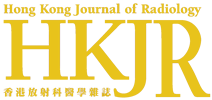Managing the Elderly Person with Cancer: a Geriatrician’s Perspective
TK Kong
Hong Kong J Radiol 2013;16:209-18
DOI: 10.12809/hkjr1312152
In Hong Kong, 53% of new patients with cancer were aged over 65 years, the incidence of cancer being 8-fold higher than that in younger subjects, and 75% of cancer deaths occur in people aged over 60 years. When cancer is suspected or diagnosed in an elderly person, the doctor faces multiple challenges: diagnostic uncertainty because of multiple pathologies, multiple aetiologies, and cancer mimics; and treatment uncertainty from lack of any evidence-base on risk-benefit. In addition, there are ethical issues in relation to ‘under-treatment’ or ‘over-treatment’, and the need for sensitive and compassionate communication with the elderly patient and his / her family. Cancer treatment decisions should be based on biological age, which takes into account of the elderly individual’s functioning and reserve, rather than the chronological age. Biological age is best estimated by comprehensive geriatric assessment, a multidimensional diagnostic process focused on determining the individual’s medical, psychological, and functional capabilities. Clinical trials of comprehensive geriatric assessment in oncology have demonstrated benefits in recognising unsuspected geriatric problems and syndromes, predicting treatment outcomes and survival, and in implementing multidisciplinary intervention plans. The goals of treatment of cancer in an elderly person include: cure if possible, prolongation of survival, prolongation of active life expectancy, symptom management, sympathetic care and support, and preservation of quality of life. The management of the elderly person with cancer benefits from an individualised approach based on comprehensive geriatric assessment and the input of a geriatrician. In the past decade, collaboration between oncologists and geriatricians has emerged as a clinical model, whereby geriatric principles and oncological assessment were integrated for the care of elderly persons with cancer.
中文摘要
老年癌症患者的治療:老年病學專家的觀點
江德坤
在香港,新癌症患者中有53%屬65歲以上,該年齡組別的癌症發病率是年輕組別的八倍,癌症引發的死亡有75%發生於60歲以上的人士。當老人被懷疑或診斷患有癌症時,醫生會面臨多重挑戰,例如因病者有多種病症、多個病因或腫瘤樣病變以致不能確定診斷,以及因缺乏風險—得益二者比較的證據而不能確定治療方案。此外,還有「治療不足」或「過度治療」,以及與老年患者及其家人溝通時所需的敏感度和同情心這類道德倫理問題。癌症治療的決定應基於患者的生物學年齡,即考慮到老人患者的身體功能和儲備,而不是其實際年齡。估計生物學年齡的最佳方法是運用老年醫學綜合評估,即一個重點確定個人體格、心理和功能性的多角度的診斷過程。老年醫學綜合評估在臨床腫瘤試驗已證實其效用,它能識別未知的老人問題和症狀、預測治療結果和存活期,以及實施多學科的治療計劃。治療老人癌症的目標包括:治愈(如可能的話)、延長壽命、延長健康預期壽命、對症治療、愛心關懷和支持,以及保持生活質素。基於老年醫學綜合評估以及老年醫學專科醫生的參與而制定的個性化治療方案能讓老人癌症患者得益。過去十年,腫瘤科醫生和老年醫學專科醫生之間的合作已成為臨床典範,借此老年醫學的原則和腫瘤學的評估得以整合,從而為老人治療癌症。

